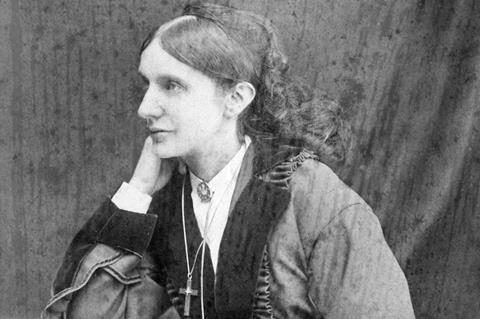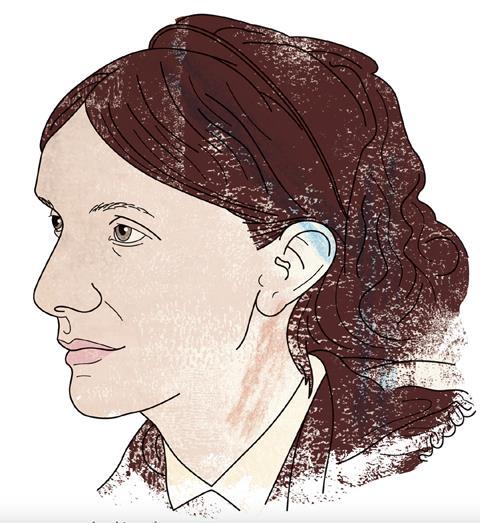She was a devout Christian, a passionate feminist and the most distinguished woman of the 19th Century. So why did Josephine Butler vanish from the pages of history?

In a world rife with human trafficking, the work of Josephine Butler (1828-1906) has never been more relevant. For decades, Butler worked tirelessly, refusing the comforts of her own refined and privileged background, to bring the hidden underworld of the Victorian sex trade into the light. In the early 1880s she discovered that girls as young as eleven were being bought from impoverished parents in London, shipped to the continent and sold to brothels in Brussels and Paris for a lucrative profit. The average life expectancy of such girls was rarely more than 28 years. Her work raised public and parliamentary awareness of the plight of destitute women, and it helped hundreds of individuals escape the trap of prostitution.
Butler is known specifically for her leadership of the campaign to repeal the Contagious Diseases Legislation. This campaign culminated in the passing of the Criminal Law Amendment Act of 1885. This landmark Act addressed sexual offences against women and minors and fixed the age of consent at 16, as it still is in Britain today. While leading this campaign, Butler became the backbone of the movement to give women the same constitutional rights as men. For decades she was known as “the most distinguished woman of the 19th Century”.
It is surprising, then, that so few of us have heard of her today. The truth is, Butler does not fit in anyone’s box. For this reason, her life vanished from the pages of history for the best part of half a century. For secular feminists writing in the 1980s seeking to uncover the historical roots of feminism, Butler was far too Christian. But for Christian historians, Butler was far too feminist. It has only been in recent years that both the depth of her faith and the centrality of her social and political work have been recognised across the board.
THE OUTCAST WOMAN
The centre of Butler’s life was an intimate and sustaining relationship with Jesus Christ. She remained a committed churchgoer all her life, but she vigorously challenged the Church for its lukewarm practices, and for turning a blind eye to those on the margins. At the heart of Butler’s passion was the figure of the outcast woman, the object of contemporary fear, hatred and lust. It was Butler’s ability to reimagine the prostitute as a human being with dignity, a voice and equal worth before the law, that made her work so radical and of such lasting significance.

At every point in Butler’s writing she contrasts observing religious codes with the desperate cry of the outcast; respectable, passionless religion versus an aching desire for God among those who were excluded from society. Butler insisted that Jesus not only welcomed the outcast, but he became the outcast, submitting to the shame of the cross in order to conquer sin and to overthrow in his person every existing category and definition of power – social power, class power and also sexual power. Ultimately, the effect of Butler’s work was to throw into sharp relief those who were doing the outcasting. As she wrote in an address given in 1879: “God’s mercy continues to be preached; but the great principles of justice of which He Himself is the source, are practically forgotten.”
LAW AND JUSTICE
During the 1860s, parliament passed a series of laws to deal with the rapid spread of venereal disease among the armed forces in Britain. The Contagious Diseases Acts as they were known were understood by parliament as perfunctory sanitary expedients, medical in intention and remit. The Acts seemed self-evidently good, in the face of what was a national epidemic. They were about hygiene and protecting the armed forces from unclean women whose moral standing was believed to be irrevocably compromised as a result of their own poor choices. It was widely thought that the only way to deal with the problem of venereal disease was to insist that every woman suspected of prostitution should undergo a compulsory examination. At the end of the examination the woman was either given a certificate to prove she was clean, or she was detained, without trial or jury, in a locked hospital unit for up to nine months until her body was free of disease.
For Butler these Acts tore away the veil that obscured a deeply rooted social abuse causing untold suffering and grief. They were a concrete symbol of an invidious sexual double standard; a woman, once compromised sexually, had no way back, while society politely excused men as merely “being men” or “sowing their wild oats”. No one raised the wider systemic question of whether or not it was right to set aside a certain group of women as chattel to be bought and sold by men for the purposes of illicit pleasure. No one raised the question of whether it was right for society to excuse such a practice, to hide it and, moreover, to regulate and sanction it through laws enacted by the state. The principle itself was left unaddressed.
But not by Butler. However effective the legislation may be for sanitary measures, she argued, they contained within them a profound injustice that could not be ignored. To leave the underlying moral inconsistencies unchallenged would be like “building a beautiful house on top of a bad drain”: there would be a “fatal poison in the foundations”. In her important work published in 1871 entitled On the Constitution Violated, Butler argued: “The danger of the whole community is imminent when the safeguards of law and constitutional rights are swept away from any portion of the community.”
Butler made a crucial connection: the way in which a society treats its most vulnerable reveals the core attitudes of that society towards human community in its entirety. Using the language of Matthew 25: “Whatever you do unto the least of these, you do it unto Christ”, Butler insisted that justice was not an abstract idea or principle. Rather, justice is a person encountered by those who receive him, however marginalised they may be, and however ensnared by sin. To act with justice is to imitate Christ.
PRAYER AS RESISTANCE
For 16 years Butler led the campaign to repeal the Contagious Diseases Acts, during which time she was shunned by respectable society, pelted with excrement and physically assaulted on numerous occasions, as were her husband and three sons. The family were subject to arson attacks and repeated death threats. At one time it took 14 bodyguards to protect Butler from a violent mob as she left a train carriage to address a meeting in a town hall.
And yet, in 1894, when Butler looked back on her life, she thanked God that it had taken so long for the Contagious Diseases Acts to be finally wiped from the statute books. Because, she argued, it was in the gap between prayer offered and prayer answered that she learned to persevere. It was in prayer, she believed, that the real social, political and spiritual change took place. If reform had come straight away it would have been superficial modification of behaviour, instead of deep cultural transformation from the foundations up.
HER IMAGINATION WAS FILLED WITH JESUS CHRIST
Wherever Butler went she formed networks of prayer. She prayed with leaders from every political party and religious denomination, with women on the streets, with former brothel owners and traffickers. In prayer, she connected those who had social and political power with those who did not. As these groups joined together from every walk of life, they also gathered evidence, heard testimonies of women caught in the sex trade, collected statistics, visited working-class families the length and breadth of the country, introduced local educational and employment reforms, gave legal aid where there was none, encouraged women to resist the legal requirements of the Acts, and organised alternative forms of employment to help women off the streets. These groups worked from the margins to reconfigure the social and political imagination.
Butler’s leadership was an imagination filled with Jesus Christ. Her contribution as a leader was to offer a fresh way of imagining those on the margins, of imagining masculinity and femininity, culture and the role of prayer in political action. Historians, secular and Christian alike, agree that it was indeed in the long years during the Contagious Diseases campaign that fundamental changes in social perceptions of men and women took place in British culture. These changes ultimately resulted in a long-term recognition that a just society requires that both sexes are treated equally before the law.
When Courage Calls: Josephine Butler and the Radical Pursuit of Justice for Women by Sarah C Williams (Hodder Faith) is out now


































No comments yet